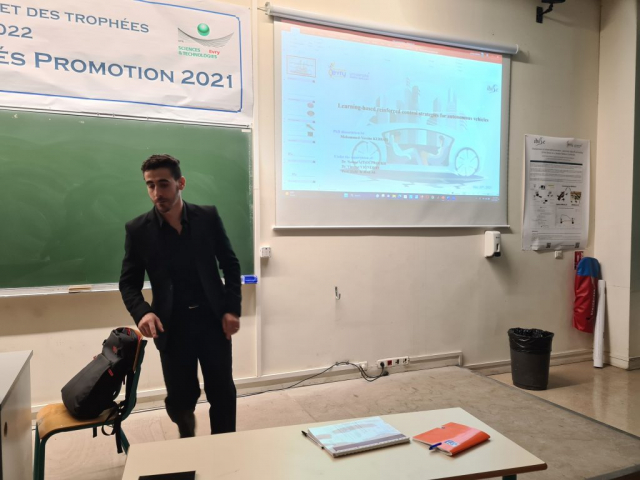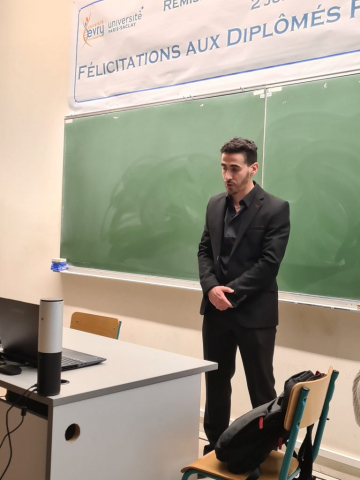Yassine KEBBATI soutient sa thèse de doctorat le vendredi 26 mai 2023, 14h sur le site Pelvoux, amphithéâtre Y.Bestaoui – Bx30. Une retransmission via Zoom est également effectuée: https://univ-evry-fr.zoom.us/j/96833458971?pwd=bDBxOWtjM1g3UjR5c1YzcERwU2QyZz09
Title: Learning-based reinforced control startegies for autonomous vehicles
Keywords : Model predictive control, State estimation, Adaptive control, Autonomous driving, Machine learning, Meta-heuristic optimization.
Abstract
In a world where everyone is constantly on the move and has more preferences for personal mobility, the number of cars on the road is constantly increasing. This has induced higher risks for road accidents, degraded traffic conditions, and further aggravated air pollution. Consequently, the research community has been working toward a shift to autonomous driving for decades. The latter can reshape mobility and transportation by reducing road accidents, traffic jams, and air pollution, yielding energy efficiency, convenience, and more productivity, as significant driving time will be used for other activities instead. Autonomous vehicles are complex systems consisting of several modules that perform perception, decisionmaking, planning, and control. The control module, consisting of longitudinal control for speed tracking and lateral control for path tracking, is essential for achieving automatic driving. Due to the highly dynamic and constantly changing nature of road environments, the control module in autonomous driving systems needs to learn and adapt to these dynamic environments by exploiting available data and using different learning techniques. This thesis contributes to the state-of-the-art enhanced control strategies applied to autonomous driving. The contributions address the longitudinal and the lateral control tasks separately and then the combined coordinated and coupled lateral and longitudinal control. For the longitudinal control, we propose the adaptive PID approach using two techniques : offline optimization and adaptation using genetic algorithms (GA-PID) and online learning and adaptation with neural networks (NNPID). We introduce an adaptive MPC technique enhanced with a new, improved PSO algorithm for steering control. Then we achieve MPC online parameter adaption by using neural networks (NNMPC) and adaptive neuro-fuzzy inference systems (ANFIS-MPC), which learn to adapt the controller to the changing working conditions and external disturbances. For the combined coordinated lateral and longitudinal control, we propose a PSO-PID to handle the task of speed tracking and an enhanced linear parameter varying model predictive controller (LPV-MPC) to control lateral dynamics. The LPV-MPC is enhanced with an improved cost function to provide better performance and stability and formulated with an adaptive LPV model, in which a recursive estimator estimates the tire cornering stiffness coefficients. Then, we address the coupled speed and steering control by developing a more elaborate LPV-MPC capable of simultaneously handling both lateral and longitudinal vehicle dynamics. Furthermore, a neural network adapts the controller’s prediction model online, and an improved genetic algorithm further optimizes its cost function. Finally, we tackle a more challenging autonomous driving problem where the vehicle drives at its handling limits, namely autonomous racing. We introduce a real-time nonlinear model predictive controller (NMPC) coupled with a moving horizon estimator (MHE). We solve the optimal racing problem with an NMPC-based offline trajectory planner that computes the best trajectory while considering the physical limits of the vehicle and circuit constraints. Then, we further enhance the control strategy by adding a learning extension based on Gaussian process regression. The latter improves the NMPC predictions by learning and correcting the mismatch between the actual vehicle dynamics and the NMPC prediction model.
Composition du jury de thèse
| Membre du jury | Titre | Lieu d’exercice | Fonction dans le jury |
|---|---|---|---|
| Naïma AITOUFROUKH-MAMMAR | Maître de Conférences HDR | Université d’Évry, Université Paris-Saclay | Directrice de thèse |
| Angelo ALESSANDRI | Professeur | Université de Gênes | Rapporteur |
| Dalil ICHALAL | Professeur des Universités | Université d’Évry, Université Paris-Saclay | Co-encadrant |
| Rodolfo ORJUELA | Professeur des Universités | Université de HAUT-ALSACE | Rapporteur |
| William PASILLAS-LÉPINE | Maître de Conférences | Central Supélec Université de Paris Saclay | Examinateur |
| Igor SKRJANC | Professeur | Université de Ljubljana | Rapporteur |
| Mara TANELLI | Professeure | Université polytechnique de Milan | Examinatrice |
| Vincent VIGNERON | Maître de Conférences HDR | Université d’Évry, Université Paris-Saclay | Co-directeur de thèse |
- Date : vendredi 26/05/2023, 14h
- Lieu : Site Pelvoux, Amphithéâtre Y.Bestaoui – Bx30, retransmission via Zoom: https://univ-evry-fr.zoom.us/j/96833458971?pwd=bDBxOWtjM1g3UjR5c1YzcERwU2QyZz09
- Doctorant : Yassine KEBBATI, Université d’Évry, Université Paris Saclay, IBISC équipe SIAM
- Directrice de thèse : Naïma AITOUFROUKH-MAMMAR (MCF HDR Univ. Évry, IBISC équipe SIAM)
- Co-directeur de thèse: Vincent VIGNERON (MCF HDR Univ. Évry, IBISC équipe SIAM)
- Co-encadrant de thèse: Dallil ICHALAL (PR Univ. Évry, IBISC équipe SIAM)
- Résumé de la thèse (anglais/français) au format PDF






